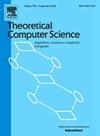On the computational and descriptional complexity of multi-pattern languages
IF 0.9
4区 计算机科学
Q3 COMPUTER SCIENCE, THEORY & METHODS
引用次数: 0
Abstract
We study the complexity of a restricted version of the universality problem: testing equivalence to for languages that are either or where . We show that this restricted problem for multi-pattern languages (MPL) is NP-hard, and for multi-pattern languages with regular substitutions (MPLREG) is not recursively enumerable. Moreover, this undecidability result holds for any class of languages that effectively contains , and is effectively closed under union, and concatenation with regular sets. Consequently, it has broad applicability and extends to many generalizations of regular languages. Sufficient conditions are then presented for a language predicate to be as hard as the restricted universality problem. By applying these conditions, we develop a uniform method for showing undecidability and complexity results simultaneously via highly efficient many-one reductions. In addition, the properties of this restricted universality problem can be used to investigate the descriptional complexity of multi-patterns. We show that the trade-off between multi-patterns and regular expressions is not exponential-size bounded. Non-recursive trade-offs between multi-patterns (or multi-patterns with regular substitutions) and numerous classes of language descriptors are also established.
求助全文
约1分钟内获得全文
求助全文
来源期刊

Theoretical Computer Science
工程技术-计算机:理论方法
CiteScore
2.60
自引率
18.20%
发文量
471
审稿时长
12.6 months
期刊介绍:
Theoretical Computer Science is mathematical and abstract in spirit, but it derives its motivation from practical and everyday computation. Its aim is to understand the nature of computation and, as a consequence of this understanding, provide more efficient methodologies. All papers introducing or studying mathematical, logic and formal concepts and methods are welcome, provided that their motivation is clearly drawn from the field of computing.
 求助内容:
求助内容: 应助结果提醒方式:
应助结果提醒方式:


